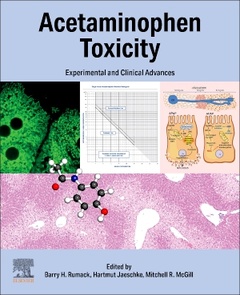Description
Acetaminophen Toxicity
Experimental and Clinical Advances
Coordinators: Rumack Barry, Jaeschke Hartmut, McGill Mitchell
Language: English
Subject for Acetaminophen Toxicity:
400 p. · Paperback
Description
/li>Contents
/li>Biography
/li>Comment
/li>
Acetaminophen Toxicity: Experimental and Clinical Advances provides detailed information on the risks of consuming the drug in various situations and effective treatments of toxicity. Divided into two parts, the foundational aspects of the book cover the mechanism of toxicity in a detailed manner, beginning with the history of acetaminophen and then delving into newly explored areas of genetics, proteomics, and metabolomics. The second half discusses clinical practices and examines where further research and therapeutic approaches may be headed. This part answers key questions about who to treat, what are the exceptions, how long do you treat, how much antidote do you need, when are other treatments necessary, and what are those other treatments. With contributions from experts in the field, the book is a thorough, well-researched, and a valuable reference for scientists, researchers, and clinicians engaged in pursuing better and more accurate diagnosis and treatment of patients with of acetaminophen toxicity.
Part 1: Foundational Aspects 1. History of Acetaminophen 2. Intracellular Signaling Mechanisms of Cell Death. 3. Mode of Cell Death 4. Inflammation 5. Regeneration 6. Biomarkers 7. Emerging Mechanisms 8. Renal Toxicity 9. Pulmonary Toxicity 10. Genomics, Proteomics and Metabolomics Part II: Clinical and Therapeutic 11. N-Acetylcysteine (NAC) 12. Adducts 13. Pre-Hospital and Poison Center Care of Overdose and Potential Overdoses Patients 14. Acetaminophen and Co-Ingestions 15. Current Standard of Care and New Developments 16. Pharmacokinetics 17. Risk Analysis and Acetylcysteine Treatment Protocols 18. Fomepizole 19. Epidemiology NPDS (Poison Center Data) CDC and Other Databases 20. Emerging Treatments 21. Liver Transplantation
Dr. Barry H. Rumack, MD is currently Professor Emeritus of Pediatrics and Emergency Medicine at the University of Colorado School of Medicine, Chairman Emeritus, Micromedex, Inc., and Director Emeritus of the Rocky Mountain Poison Center of the Denver Department of Health & Hospitals, University of Colorado Health Sciences Center. His research interests include Acetaminophen Overdose and General Medical Toxicology. He has published over 250 peer-reviewed articles, authored or edited numerous books and book chapters. He is on the editorial board of a number of journals including Clinical Toxicology, Emergency Medicine, among others. He is a Fellow of the American Academy of Clinical Toxicology, American College of Medical Toxicology, and American Academy of Pediatrics and member of Society of Toxicology, American Association of Poison Control Centers, and American College of Emergency Medicine.
Dr. Hartmut Jaeschke, PhD, is the University Distinguished Professor and Chairman of the Department of Pharmacology, Toxicology, and Therapeutics at the University of Kansas Medical Center, Kansas City, Kansas. He joined KUMC in 2006. He is a Fellow of the Academy of Toxicological Sciences and Fellow of the American Association for the Study of Liver Diseases. He has published more than 470 peer-reviewed manuscripts, invited reviews, and book chapters in the areas of liver toxicology and liver pathophysiology. He currently serves as Associate Editor for Toxicological Sciences, the inaugural Editor-in-Chief of Livers (since 2020) and is a member of 14 editorial boards. In 2019, he was the recipient of the Translational Impact Award from the Society of Toxicology. His major research interests include basic mechanisms and translational aspects of xenobiotic-induced hepatotoxicity and tissue repair with a focus on acetaminophen overdose and mechanisms of inflammatory liver injury in animal models and humans.
Dr. Mitchell R. McGill is currently an Assistant Professor
- Includes comprehensive coverage of the pharmacological mechanisms of toxicity
- Provides risk analysis regardless of patient presentation or timing of ingestion or amount with algorithmic support
- Covers how to determine level of toxicity and need for liver transplant with algorithmic support
- Outlines new therapeutic approaches
These books may interest you

KidneyToxicological Assessment 160.25 €



